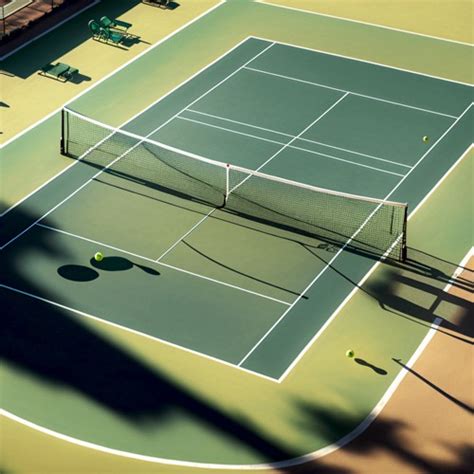Explore the core principles of sportsmanship, its importance in player relationships, and techniques for fostering a positive tennis culture.The Importance of Sportsmanship in Tennis
In the world of tennis, where competition often runs high, the spirit of sportsmanship plays a pivotal role in shaping the experience for players and spectators alike. This article delves into the essence of sportsmanship, highlighting its core principles and the profound impact it has on forging relationships between athletes. Good sportsmanship not only fosters integrity and fair play but also enriches the culture of tennis, cultivating an atmosphere of respect and honor. Whether you’re a seasoned player, a coach, or a passionate fan, understanding the significance of sportsmanship can enhance not just the game itself but also the broader tennis community. Join us as we explore practical techniques for developing good sportsmanship and discover the long-term benefits it brings to the sport we love.
Defining Sportsmanship: Understanding Its Core Principles
Sportsmanship embodies a set of principles that transcend the confines of compliance with rules, reflecting the values and attitudes displayed during competition. At its core, sportsmanship emphasizes respect, fairness, and graciousness—qualities essential for fostering a healthy sporting environment. Here are some core principles that define sportsmanship:
| Core Principle | Description |
|---|---|
| Respect | Valuing opponents, officials, and teammates contributes to an atmosphere of mutual consideration. |
| Fair Play | Adhering to the rules of the game while demonstrating integrity and honesty. |
| Graciousness | Accepting victory with humility and defeat with dignity, which encourages a positive competitive spirit. |
| Encouragement | Supporting fellow players fosters camaraderie and enhances the overall play experience. |
Understanding these core principles is vital as they serve as the foundation for how players and coaches interact within the sport. By embracing the importance of these values, the tennis community can promote not just a competitive spirit but a welcoming and supportive environment for all participants.
The Importance Of Sportsmanship In Building Player Relationships
The realm of tennis is not only about skillful serves and perfect volleys; it’s also about the interactions and bonds formed between players. The Importance of sportsmanship plays a pivotal role in fostering positive relationships among competitors. When players demonstrate respect and integrity on the court, it encourages a supportive atmosphere that benefits all participants.
Building strong player relationships through sportsmanship leads to several advantages:
| Benefits of Sportsmanship | Impact on Player Relationships |
|---|---|
| Mutual Respect | Fosters trust and camaraderie among players. |
| Positive Communication | Encourages open dialogue and constructive feedback. |
| Ability to Handle Conflict | Promotes resolution and minimizes hostility. |
| Sense of Community | Builds lasting friendships beyond the sport. |
Furthermore, when players exhibit good sportsmanship, they set an example for others, contributing to a culture that values respect and fairness. This creates an environment where junior players want to emulate their role models, further enhancing the tennis community.
The relationships forged through sportsmanship in tennis can lead to a more enjoyable and enriching experience for all involved, demonstrating that the heart of the game extends beyond individual performance to a shared love for the sport.
How Sportsmanship Influences Game Integrity And Fair Play
In the world of tennis, the essence of the game transcends mere skill and physical prowess. At the heart of the sport lies the principle of sportsmanship, which plays a crucial role in maintaining the integrity of the game. Good sportsmanship fosters an environment where players not only respect one another but also adhere to the rules and spirit of the game.
The importance of sportsmanship in tennis cannot be overstated. It serves as a foundation for fair play, encouraging players to compete honorably and ensuring that the outcomes of matches are determined by skill rather than unsportsmanlike behavior.
Firstly, sportsmanship reinforces the notion of fairness in gameplay. Players who exhibit good sportsmanship are more likely to uphold the rules of tennis, which is essential for fair competition. By acknowledging faults, respecting line calls, and adhering to match protocols, players contribute to a level playing field. In contrast, unsportsmanlike conduct can lead to controversies that undermine the authenticity of the game.
| Aspect | Positive Effects of Sportsmanship | Negative Effects of Unsportsmanlike Conduct |
|---|---|---|
| Player Relationships | Stronger bonds and mutual respect | Conflicts and rivalries |
| Game Integrity | Upholding rules and fairness | Questionable rulings and disputes |
| Audience Perception | Increased admiration and support | Decreased engagement and support |
Moreover, good sportsmanship enhances the experience for both players and spectators. Spectators appreciate matches characterized by respect and honor, which ultimately elevates the reputation of the sport. When players display integrity—such as shaking hands after a match or demonstrating empathy during tough moments—they contribute to a positive atmosphere that benefits everyone involved.
The influence of sportsmanship on game integrity and fair play in tennis is profound. By exemplifying these values, players not only contribute to the sport’s credibility but also ensure that their legacies reflect the true spirit of competition. Emphasizing the importance of sportsmanship should be a goal for everyone within the tennis community, from players and coaches to fans and officials. This collective commitment enhances the sport, ensuring that tennis remains a noble pursuit for generations to come.
Developing Good Sportsmanship: Techniques For Coaches And Players
Good sportsmanship is vital to fostering a healthy competitive environment in tennis. Coaches and players can adopt various techniques to promote and develop The Importance of sportsmanship both on and off the court.
- Model Positive Behavior: Coaches should exemplify good sportsmanship in their actions and responses during practice and matches. By displaying respect for opponents, officials, and the game itself, they set a standard for players to emulate.
- Encourage Open Communication: Foster an environment where players feel comfortable discussing their thoughts and feelings about competitions. Open dialogues can help players understand the significance of fair play and respect for others.
- Teach Conflict Resolution: Equip players with skills to handle disputes amicably. Providing training on resolving conflicts allows players to navigate challenges gracefully without compromising their integrity.
- Reward Positive Sportsmanship: Recognize and celebrate instances of good sportsmanship, whether through awards, shout outs, or other forms of acknowledgment. This reinforces the behavior and encourages others to follow suit.
- Set Clear Expectations: Coaches should establish clear guidelines about acceptable behavior during matches and practices. Emphasizing the values of respect, fairness, and teamwork can help players understand what is expected of them.
- Incorporate Sportsmanship in Training: Integrate discussions and practices that focus on sportsmanship into regular training sessions. This could include role-playing scenarios to practice responses to challenging situations, particularly during high-pressure moments.
- Promote Team Bonding Activities: Organizing team-building exercises strengthens the bonds among players, allowing them to appreciate their teammates and understand the importance of supporting one another, win or lose.
By implementing these techniques, coaches can ensure that their players grasp the The Importance of sportsmanship and carry those values throughout their tennis careers and beyond. The enhancement of sportsmanship within teams not only elevates individual players but contributes to a positive golfing atmosphere.
The Long-term Benefits Of Sportsmanship In Tennis Culture
The long-term benefits of sportsmanship in tennis culture are profound and multifaceted. When players exhibit the importance of sportsmanship, they contribute to a positive environment that nurtures both competitiveness and respect among participants. This culture not only enhances the experience for players but also positively influences fans and future generations of tennis enthusiasts.
One key benefit is the fostering of a supportive community. As players learn to value sportsmanship, they create lasting relationships built on mutual respect, understanding, and camaraderie. These relationships encourage collaboration and mentorship within the sport, which can lead to a new generation of players who similarly value and practice these principles.
Moreover, a culture of sportsmanship enhances the reputation of tennis as a sport. Events characterized by fair play and respect attract more spectators, sponsors, and media attention, leading to increased opportunities for players and tournaments alike. This elevation in the sport’s profile further emphasizes the importance of upholding integrity and fair competition.
Another benefit is emotional resilience among players. When tennis players commit to sportsmanship, they develop a strong sense of character and emotional intelligence that helps them handle wins and losses gracefully. This resilience not only supports their career longevity but also serves as an example to aspiring players on how to manage pressures both on and off the court.
Embracing sportsmanship leads to a richer, more sustainable tennis culture that prioritizes respect, integrity, and community, significantly enriching the sport for everyone involved.
Frequently Asked Questions
What is sportsmanship in tennis?
Sportsmanship in tennis refers to the ethical and courteous behavior expected from players, including respect for opponents, officials, and the game itself.
How does sportsmanship impact the game of tennis?
Sportsmanship enhances the integrity of the game, promotes fair play, and creates a more enjoyable environment for players and spectators alike.
Why is sportsmanship particularly important in individual sports like tennis?
In individual sports, the behavior of a player reflects not only on themselves but also on the sport as a whole, making sportsmanship crucial for maintaining respect and dignity in competition.
Can poor sportsmanship affect a player’s reputation?
Yes, poor sportsmanship can significantly damage a player’s reputation, leading to loss of sponsorships, endorsements, and respect within the tennis community.
What are some examples of good sportsmanship in tennis?
Examples of good sportsmanship include acknowledging an opponent’s good play, shaking hands after a match, and accepting the referee’s decisions gracefully.
How can coaches promote sportsmanship among their players?
Coaches can promote sportsmanship by modeling respectful behavior, emphasizing the importance of ethics, and discussing scenarios where sportsmanship should prevail.
Are there consequences for lack of sportsmanship in tennis?
Yes, players displaying lack of sportsmanship may face penalties, including fines, suspension, or disqualification, depending on the severity of their actions.









